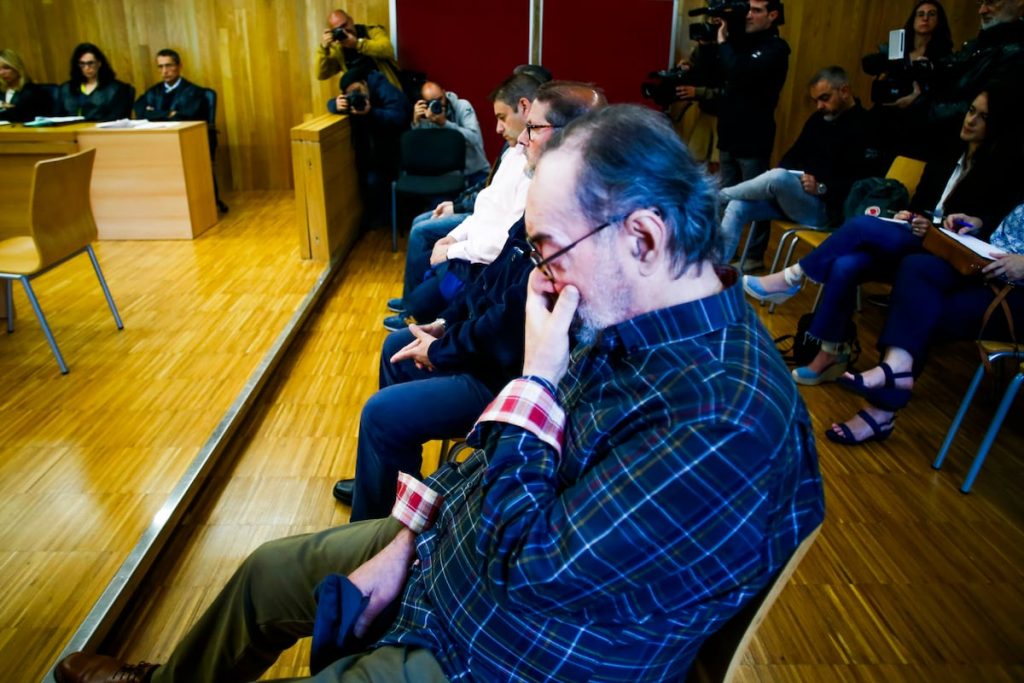The second and final session of the trial in Lugo to resolve the Operation Carioca after 16 years was prolonged due to errors in the prosecution’s written document, which had been modified to include favorable plea deals with four of the five accused. The prosecutors needed the lunch break to amend the errors, and the sentences included in the reformulated document were not known until after six in the evening. The accused had recognized the facts in exchange for reduced sentences in the first session earlier in the week, with three of the proxenets receiving only fines and the main accused, Armando Lorenzo Torre, seeing his 21-year prison sentence reduced to four years and three months due to health reasons. José Manuel García Adán, Marcos Grandío Ascariz, and Jesús González Varela, who were also accused, faced shorter sentences and fines for bribery.
Armando Lorenzo, accused of various crimes including disclosure of secrets, bribery, promoting prostitution, attempted extortion, and sexual abuse, will also have to pay compensation to a Brazilian woman who filed a complaint against him, leading to the investigation of the largest case of human trafficking ever in the country. The allegations included claims that the accused officers protected and collaborated with the traffickers in exchange for money, drinks, and sexual favors. The only accused who did not agree to the plea deal was the brigadier Baquero, who denied the charges of soliciting sexual favors and failing to investigate crimes. The allegations against him were related to not investigating a marriage of convenience between a man from the province and a prostituted foreign woman.
The fraudulent marriage was reported by Baquero and Lorenzo’s colleagues and annulled by the court. Another accusation against Baquero was soliciting sexual favors from a club worker he had met during a raid and allegedly harassed afterwards. Testimonies from witnesses were presented during the trial, including a complaint from the victim who was unable to testify via video conference. Other Guardia Civil officers and investigators also testified during the trial, providing evidence of the accused officers’ involvement in protecting and facilitating human trafficking activities in Lugo.
Members of the citizen platform Impunidade Carioca attended the trial and expressed disappointment with the sentences proposed by the prosecution, calling for harsher punishment for those involved in serious crimes. The platform emphasized the importance of prosecuting crimes and protecting victims, hoping for a fair outcome in the case. The trial concluded with the case being ready for sentencing, with a total of 274 volumes of evidence and numerous witnesses involved in the complex investigation. The defense lawyers of the accused expressed their frustration with the lengthy legal process and lack of evidence against their clients, calling for acquittal in the absence of proof.
Overall, the trial of the Operation Carioca in Lugo highlighted the complexities and challenges of prosecuting human trafficking cases and holding accountable those involved in criminal activities. The plea deals and reduced sentences for some of the accused sparked criticism from civil society groups, who called for stronger legal action and protection of victims. The case remains significant in the fight against human trafficking and the efforts to dismantle criminal networks involved in exploitation and abuse. The outcome of the trial will have implications for future investigations and prosecutions of similar cases, emphasizing the importance of adequate legal procedures and accountability for those responsible for such heinous crimes.


